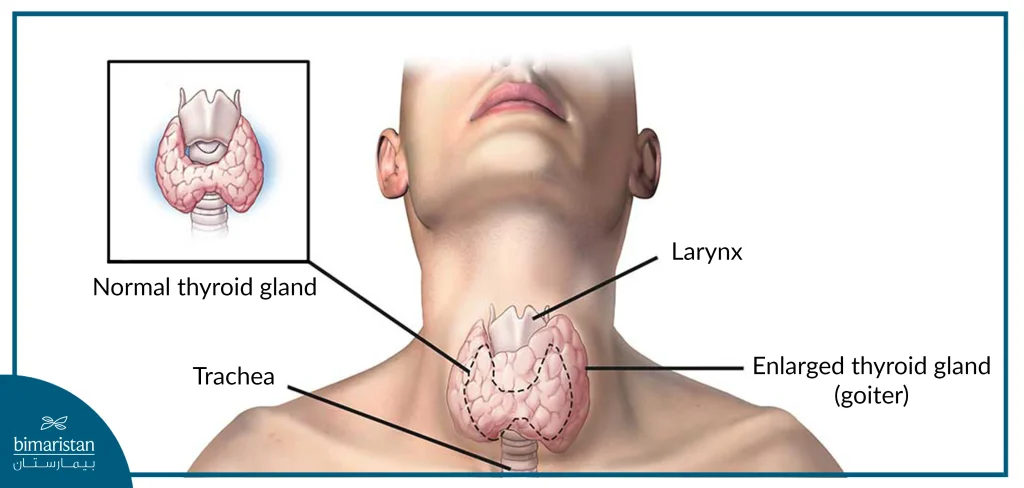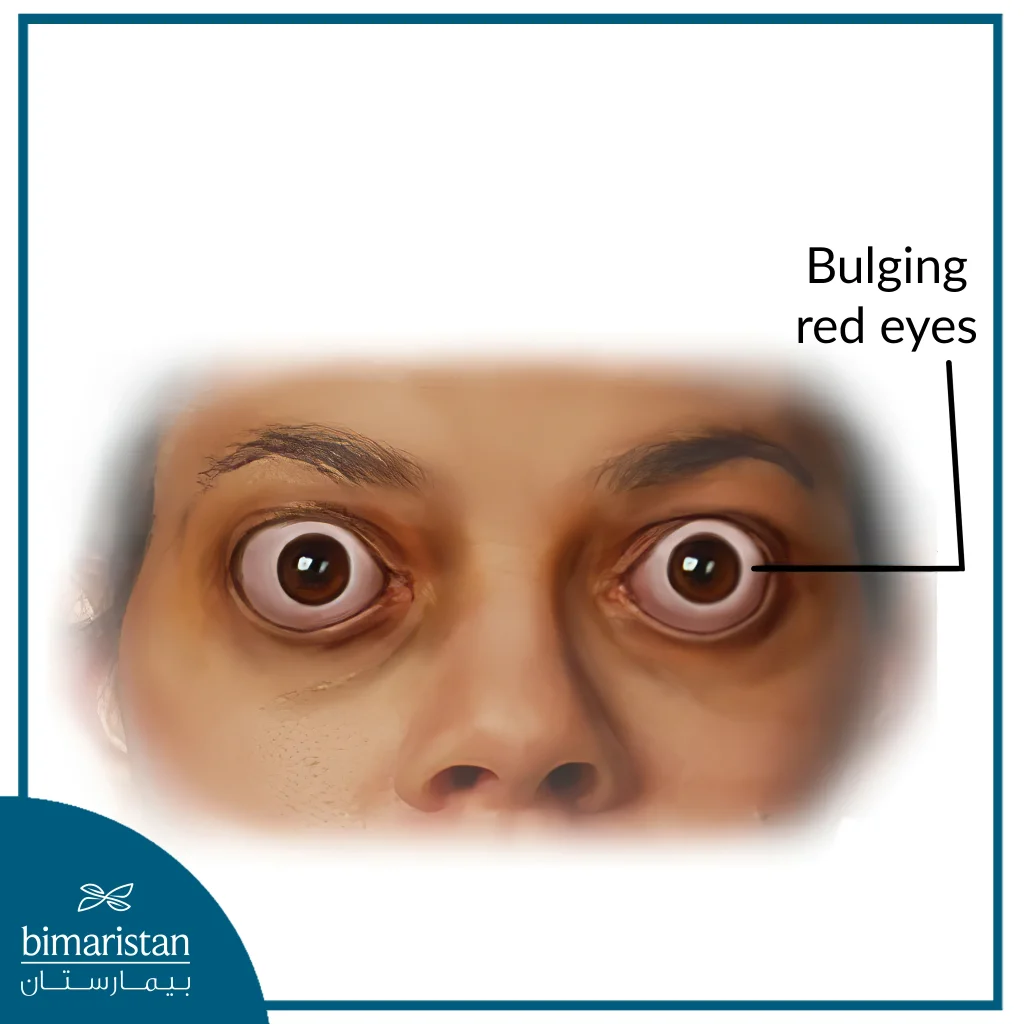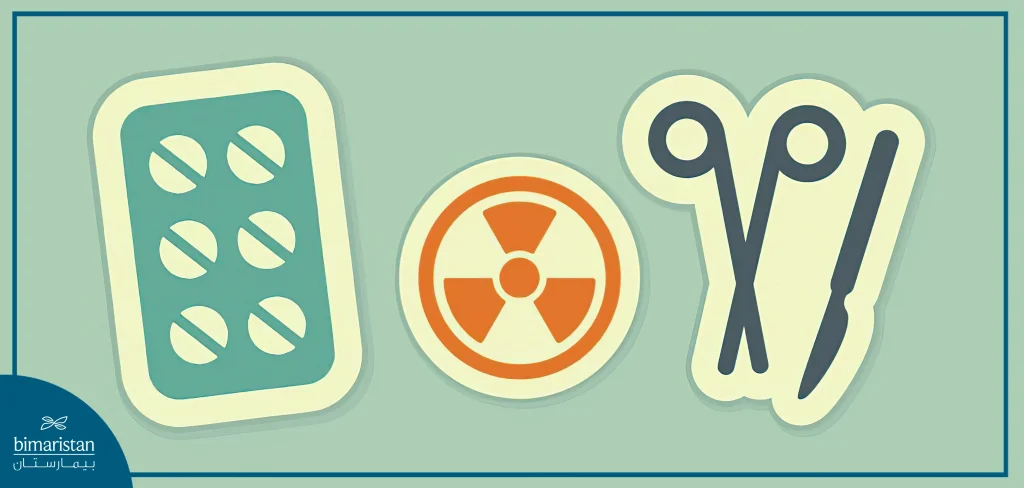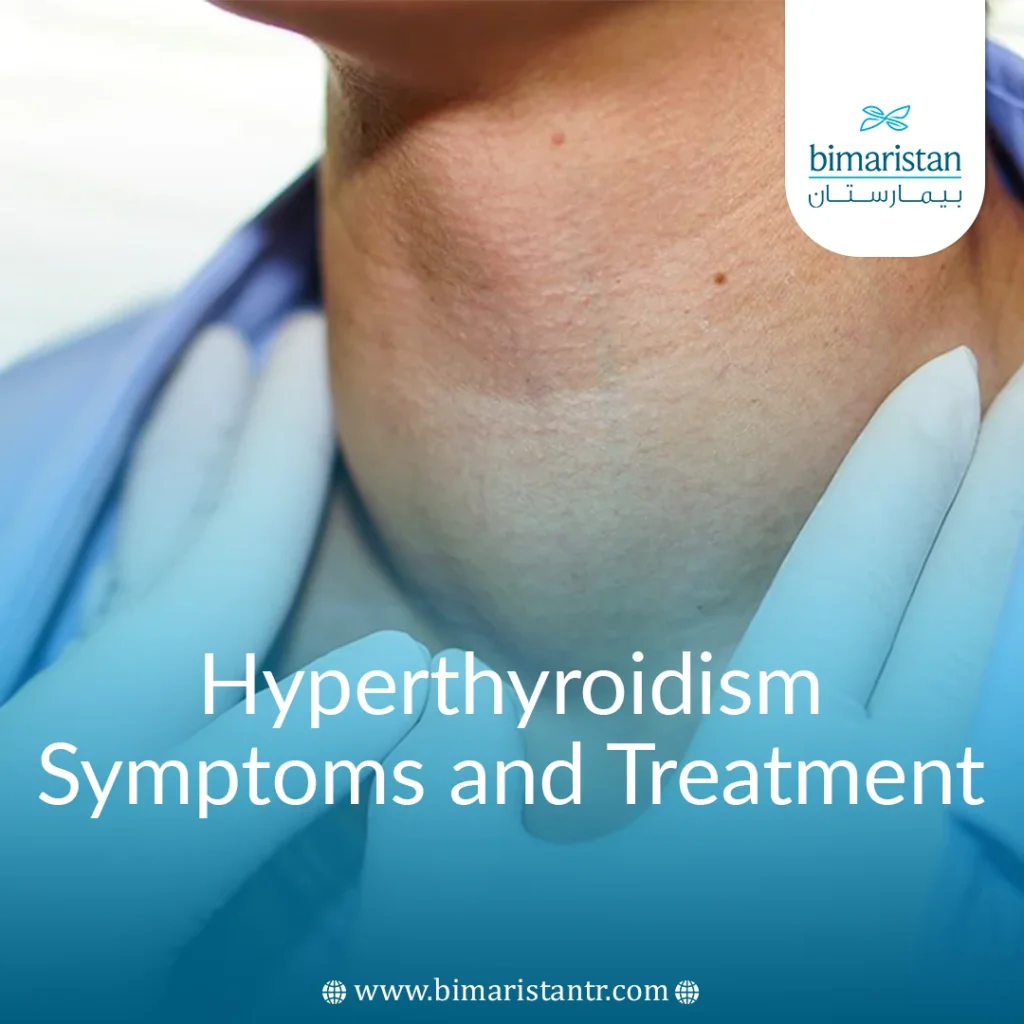Hyperthyroidism is a disease resulting from an increase in thyroid hormones in the blood, especially the T4 hormone. There are many ways to treat the symptoms of this disease under the supervision of specialized doctors.
Hyperthyroidism and its treatment
The thyroid gland is butterfly-shaped in the neck in front of the larynx and above the trachea.
The thyroid gland produces and secretes the hormones thyroxine T4 and triiodothyronine T3 under the influence of the pituitary hormone TSH. According to their concentration in the blood, thyroid hormones control metabolic processes in the cells of the human body.
Hyperthyroidism occurs when excessive amounts of thyroid hormones are produced and secreted into the blood. This leads to many different symptoms, including increased activity of all body systems and increased energy consumption.

Early diagnosis and treatment of this disease can help eliminate harmful symptoms and protect the body from complications that may result from high thyroid hormones.
The American Thyroid Association estimates that more than 20 million people in the United States have hyperthyroidism, 60% of whom are unaware of the disease, and women are 5-8 times more affected than men.
Causes of hyperthyroidism
Several conditions can cause this disease, including:
Graves’ disease
The most common cause of hyperthyroidism accounts for more than 70% of cases. It affects women more than men. It is an autoimmune disease in which antibodies attack the thyroid gland, causing it to secrete excessive amounts of its hormones.
Studies have confirmed that this disease is a genetic condition that is caused by several genes; when a family member has Graves’ disease, the chances of relatives developing it increase (although environmental factors also play a role).
Bulging eyes are one of Graves’ disease’s most prominent symptoms. Dry eyes, eye congestion, tearing, restricted eye movement, double vision, and light sensitivity may accompany them.

Don’t forget to tell your doctor if any of your relatives have hyperthyroidism to help them determine the causes of it.
Increase your body’s iodine intake
Iodine is the main component of the hormones thyroxine and triiodothyronine, so consuming too much iodine may cause a temporary increase in thyroid activity.
Iodine is found in some foods, such as fish, dairy, cheese, and iodized table salt. Some medications also contain iodine, such as amiodarone, which is used to treat cardiac arrhythmias.
Thyroid nodules
A thyroid nodule is an abnormal mass or growth of thyroid cells that secrete more thyroid hormones than the body needs. Sometimes, thyroid nodules can become cancerous and lead to thyroid cancer.
Thyroiditis
Inflammation of the thyroid gland causes it to swell and some of its hormones to leak into the bloodstream, causing a temporary state of hyperthyroidism, followed by hypothyroidism due to the depletion of its hormonal stores.
Thyroiditis may occur when taking thyroid medications, after pregnancy, or as a result of an infection that affects the gland or a malfunction in the immune system.
Symptoms of hyperthyroidism
The symptoms and signs of this disease vary, as high thyroid hormone affects the entire body and interferes with its various functions, so it is difficult to detect at first and is sometimes confused with a state of anxiety.
The most common symptoms of hyperthyroidism include:
- Goiter (enlargement of the thyroid gland in the neck)
- Nervousness, irritability and mood swings
- Excessive sweating
- Increased appetite and weight loss
- Fatigue and insomnia
- Muscle weakness
- Diarrhea and changes in digestive habits
- Loss of libido and infertility
- Menstrual irregularities in women
- Rapid heartbeat (which may cause tremors)
- Tremors in the hands or fingers
- Difficulty breathing
- Hair loss and breakage
Symptoms of hyperthyroidism can be subtle in older adults; the only symptoms are a rapid heartbeat, intolerance to heat, and feeling tired with simple daily activities.
Complications of hyperthyroidism
This disease may cause some risks and complications, the most important of which may be:
- Thyroid storm: or what is called “thyrotoxicosis”, which is a rare but dangerous and life-threatening complication. Thyrotoxicosis occurs when very large amounts of thyroid hormone are secreted within a short period, which leads to a rapid exacerbation of the symptoms of hyperthyroidism. The condition must be treated immediately and urgently.
- Heart problems: such as tachycardia and cardiac arrhythmias such as atrial fibrillation, which increases the risk of myocardial infarction and congestive heart failure.
- Eye problems: especially in cases of Graves’ disease.
Diagnosis of hyperthyroidism
In the context of thyroid evaluation, the doctor will listen to the patient’s complaint, take a family medical history, and conduct a clinical examination of the thyroid gland by examining and palpating it to detect goiter and thyroid nodules.
The doctor can confirm the diagnosis by performing the following tests and investigations:
- Thyroxine, free thyroxine, and triiodothyronine levels: This test determines the amount of thyroid hormone in the blood. However, it may give false results if the hyperthyroid patient takes biotin (a type of vitamin B).
- Thyroid-stimulating hormone (TSH) measurement: The pituitary gland secretes it to stimulate the thyroid gland to produce thyroid hormone. Normally, when thyroid hormones rise, the pituitary responds by reducing the amount of TSH secreted.
- Gamma-radioactive iodine uptake imaging: Since hyperthyroidism is associated with increased uptake of radioactive iodine by the gland, this test is performed by having the patient take radioactive iodine and then lie down so that a special camera can image the thyroid gland, which reveals whether the hyperactivity includes the entire thyroid gland or part of it.
- Thyroid ultrasound: To measure the size of the thyroid gland and detect the presence of nodules or masses in it and to know whether they are solid or cystic.
- CT or MRI: These techniques may help in the diagnosis by detecting a TSH-secreting pituitary tumor.
Hyperthyroidism Treatment
Hyperthyroidism is usually treatable. Your doctor will help you decide the best way to treat it based on your age, general health, and the cause and severity of the disease. Treatment options include:

Hyperthyroidism treatment with medications
Some medications aim to treat the symptoms of hyperthyroidism, while others aim to reduce the production of thyroid hormones:
- Beta-blockers: Although these medications do not affect thyroid hormone levels, they help relieve symptoms of hyperthyroidism, such as rapid heartbeat, heart palpitations, tremors, and irritability, by limiting the effects of thyroid hormone on the body until its levels in the blood decrease. Beta-blockers are used to treat temporary hyperthyroidism that may be followed by hypothyroidism and can be stopped once thyroid hormones return to normal.
- Thyroid hormone synthetase inhibitors: This group includes methimazole and propylthiouracil. Symptoms take several weeks or months to improve, but these medications should be taken for at least a full year. Side effects include joint pain, hair loss, rash, and rarely liver damage.
As for treating hyperthyroidism with herbs, it is not scientifically proven and lacks evidence and studies.
Hyperthyroidism treatment with radioactive iodine
The patient can take tablets or liquids containing radioactive iodine. This radioactive iodine travels through the blood to the thyroid gland and destroys overactive cells, causing thyroid hormone levels to decrease in the blood.
The amount of radioactive iodine here is greater than the amount used in thyroid imaging but less than the amount used to treat thyroid cancer.
Treatment of hyperthyroidism with radioactive iodine may reduce the activity of the thyroid gland to the point of hypothyroidism (which is easier to treat), which requires replacing the thyroid hormone with medications containing it.
It usually takes 3-6 months for symptoms to improve. Despite concerns about the risks of using a radioactive substance, this technique has been used for a long time without any problems to treat hyperthyroidism. Still, this option is not suitable for pregnant and breastfeeding women.
Hyperthyroidism treatment with surgery
If medications are not a suitable option for you to treat hyperthyroidism, then the doctor performs surgery to remove the thyroid gland .
During hyperthyroidism surgery, the doctor removes most or all of the gland tissue. Risks may include damage to the vocal cords or parathyroid glands (which control calcium levels in the blood).
You may need to take antithyroid hormones before the surgery to avoid complications. After the surgery, hypothyroidism or hypoparathyroidism may occur, forcing you to take hormone replacements.
Sources:

